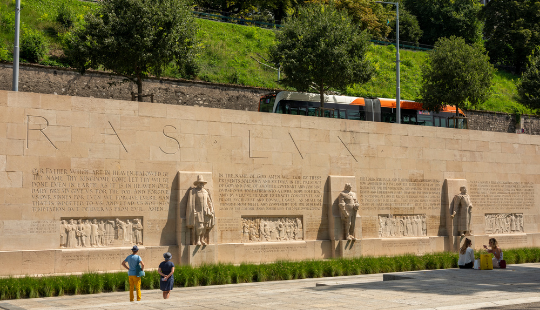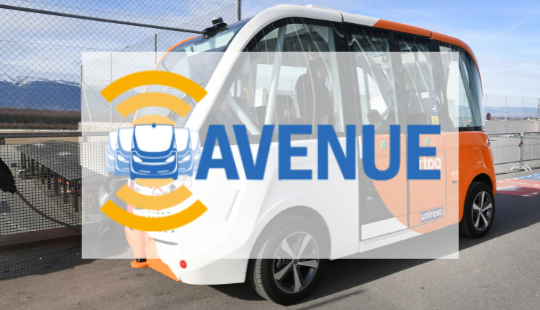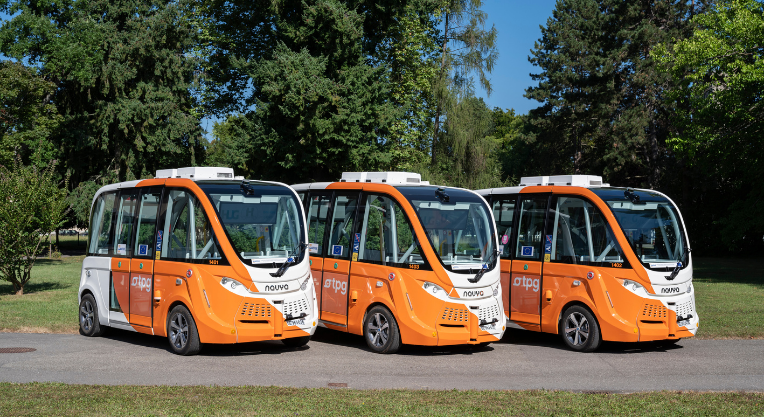tpg at the forefront of innovation
tpg studies and implements innovative solutions to promote access to mobility for all and offer mobility while respecting sustainable development. For many years, we have been committed to the common effort to address the planet's pressing challenges. That's why innovation is a key part of our Cap2030 corporate strategy. Our challenge is to offer sustainable mobility while making the travel experience simple and enjoyable.
TOSA, innovating to provide mobility in Geneva
Deployed in 2018 on Line 23, the TOSA (Trolleybus Optimisation Power System) bus is the first 100% electric, rechargeable battery-powered, large-capacity articulated bus system that is environmentally friendly while also providing wide-range city service. This technology has put Geneva and Switzerland on the map in terms of sustainable mobility innovation.
Autonomous vehicles
Since 2018, tpg has been experimenting with autonomous driving technologies and participating in the European research project AVENUE (Autonomous Vehicles to Evolve to a New Urban Experience).
The autonomous vehicles operated by tpg are minibuses with the ability to drive automatically and autonomously in traffic without the intervention of a driver. Operating on an on-demand service, our autonomous vehicles do not use a fixed route, do not respect a specific schedule and can accommodate up to 10 people. We are convinced that this service is a relevant solution in areas where transport demand is diffuse and where conventional regular lines are inefficient.
The AVENUEproject
Led by the University of Geneva, the European AVENUE project aims to prepare the way for technical, economic and legislative integration of autonomous vehicles in urban spaces and in existing public transport offers.
In Avenue's vision, autonomous vehicles will ensure safe, fast, economical, ecological and personalized transport of passengers, minimizing vehicle changes, picking them up at their door and dropping off as close as possible to their destination. To this end, the project's mission is to demonstrate that autonomous vehicles will be a key part of the solution for public transport in the future.
The researchers' roadmap is to identify the needs and motivations of future users, address technological challenges and raise legal barriers and develop business models that can make this new mode of transport viable. A vast four-year project with a budget of €20 million, of which €16 million is funded by the European Commission, brings together 16 partners, including five from Switzerland.
Geneva, among the 5 pilot cities
Geneva was selected among the 3 other pilot cities including Copenhagen, Luxembourg City and Lyon. Indeed, they have all the traffic and road development characteristics of large cities and has the advantage of having its public transport network managed for the most part by a single operator, tpg.

Objectives of the AVENUE project
Each of the 16 partners brings its expertise to address the three research axes of the project namely:
- analysis of autonomous driving from the angles of safety, traffic flow and the ability of vehicles to adapt to particular circumstances,
- route optimization (both for user comfort and to reduce operating costs)
- the offer of additional services on board and around the vehicles (augmented reality, video-conferencing, assistance for children and PRM, etc.).

At the end of the project in 2022, the partners will be able to provide recommendations to authorities and urban planners on adaptations to the law and urban planning, as well as to propose business models to the operators.
The AVENUE project in figures
22 millions €
4 ans
N° 769033
La Commission européenne

Avenue project on the Belle-Idée estate
The Belle-Idée estate, owned by the Hôpitaux Universitaires de Genève (HUG), has been chosen as the experimental location for the AVENUE project. The site includes the majority of general or specialized psychiatric hospital units as well as the Trois-Chêne geriatric hospital. Located at 2, chemin du Petit-Bel-Air in Thônex in the Canton of Geneva, the estate covers an area of approximately 38 hectares and includes several pavilions and care units. The perimeter of Belle-Idée is a moderate area at 30 km/h, open to the public, delimited by automatic barriers and constitutes a mesh of streets with a relatively low traffic load. The idea is to first add frequency to the route, already served by traditional buses. Then, the various buildings on the site will be connected via a real-time demand service.
Initially, three vehicles, such as Navya Autonom Shuttle, were put into service on the site in 2020. This project represents an opportunity for HUG to experiment with this innovative local transport solution that will be very useful to patients and visitors to psychiatric and geriatric hospitals (Hôpital des Trois-Chêne), as well as to staff working on the site.
Connected stops for a better passenger experience
One of tpg’s priorities is the comfort of passengers at all times during their travel. With this in mind, we are designing a smart, connected bus stop model. This goal tackles two concepts. On the one hand, it is about improving passenger experience at this point of contact with public transport through additional services made possible by new technologies. On the other hand, it provides tpg with the tools we need to better adapt our services. Within the framework of this digital transformation project, we collaborate with partners such as the HES of Geneva.
Elements of this groundbreaking stop will soon be unveiled to the public. If the tests prove conclusive, deployment of connected stops on the network will then be considered. The evolution of the more than 600 bus shelters in the network, which are controlled by the various municipalities, represents a major challenge; however, this is also an opportunity for more cooperation between the municipalities and tpg.